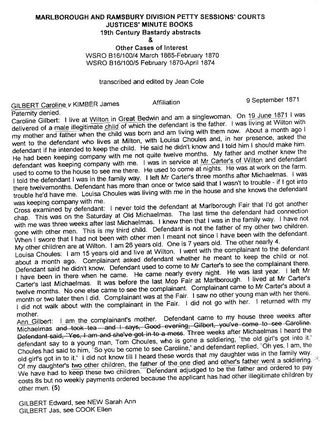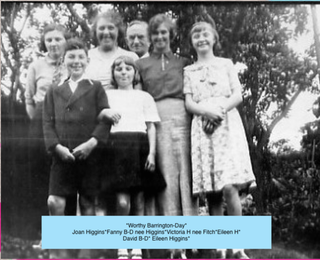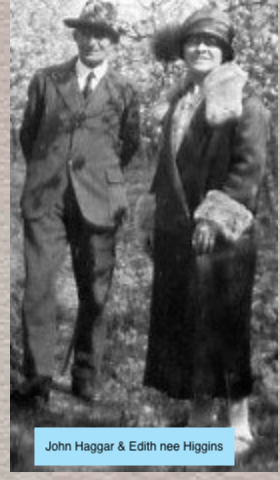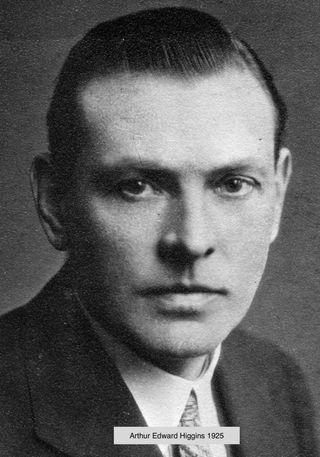Gilbert - The search for Louisa Anne
The Search for Louisa Gilbert (Griffin)
In those early days, my cousin Suzanne beavered away on family trees and I went off identifying the people in the photos and trying to find out about them.
My search for my Great Grandmother, Louisa Ann Higgins, nee Griffin started way back in the early 1990’s.
I had been told that she was born in 1866 in Wilton and Christened in East Grafton near Salisbury in Wiltshire.
My mother would not talk about her and I never met her.
My mother said that she had run away and left my mother's father when he was a little boy. Because of that legacy he had, in his turn, left my mother’s Mum to bring up my mother and her four sisters on her own.
One Aunt said she had returned to her husband and children but another Aunt said she tried and he wouldn’t have her back.
What a sad story.
I searched on-line for her birth and marriage records many times and found nothing.
So I went off to Wiltshire to the Records Office.
I spent a whole day there – I looked at Baptisms of Church Of England, Catholic, Non-Conformist, Quaker....you name it. Nothing. I looked at Registers of Births, Marriages and Deaths. Nothing.
The lady in the Record Office was as helpful as can be – thank you, whoever you are!
She brought out armfuls of possible sources and helped us to scour them.
This was my first visit to a Records Office and I really struggled to find my way around. Now, I think I might be more canny in my searches and probably more successful.
Sadly, I left empty handed.
Several weeks later, I was astonished to get a fat packet from the Records Office!
That wonderful lady had been so intrigued that she had continued the research on my behalf. In that packet were documents that showed that she was not Louisa Ann Griffin at all. She was Louisa Ann Gilbert!
Her mother, Caroline Gilbert, had been unmarried at the time of Louisa’s birth. She had not married George Griffin until some years later. Louisa then used her step fathers name.
Once her real surname - Gilbert - was known, finding her birth, baptism, marriage and death records was easy.
Census returns show that Louisa was with her Husband and children in 1891 but not in 1901. I had to wait until 2011 when the 1911 census was released to find the answer to the question. My Aunt was right. Louisa was back with Louis.
Attempts to find where she was in the intervening years have failed.
The story is that Louis was a bit of a brute. Lousia was given some money to go off to buy supplies with the groom and they ran off together. The groom was later killed when a horse rolled on him.
Louisa was so full of regret and sorrow that at some time she adopted 2 girls – Audrey and Mildred.
Louis died quite young – in 1919.
Louisa became Housekeeper to a Farmer Grist and Mildred married his son, Edgar.
Where are the descendants now, I wonder?
Most of what I know about Louisa as a person comes from my cousin David Barrington-Day.
He was the son of Fanny Higgins, Louisa’s daughter and sister to my grandfather Arthur Edward Higgins.
David Barrington - Day told me-
"My grandfather (Louis Arthur Higgins) was a master baker. Grandma came from a more rural, working class background.
I met one or two of grandma’s relatives when I was very young including her brother Walter who was a shepherd and her brother, Tom and another who was a lock-keeper. She seemed to belong to quite a large family but did not have much to do with them, no doubt due to old quarrels.
I first knew Grandma when I was 5 and she was 65, when my mother took me to Alton Barnes on holiday and from then on I visited her most years. Mother, who was only too glad to get rid of me during the holidays, would put me on a bus or train with a label attached to my jacket and arrange for me to be met at the other end.
After Grandfather died, I believe Grandma worked as a housekeeper in various places, including one near here (Moreton-In -Marsh, Gloucester) which mother had secured for her, but eventually went to look after her aged mother (Caroline Griffin, nee Gilbert) in a thatched cottage at Alton Barnes. . After her mothers death she moved a mile or two up the road to Devizes where she died in 1956 aged 91. She got married again very late in life while living at Alton Barnes and changed her name to Bailey. He was equally elderly and pre-deceased her after not more than a year or two. She looked, and was, a true countrywoman, though she was always frightened of cows. She was a real lady, with a quiet way of speaking – I never heard her raise her voice - and a heart-warming smile. She never had two half-pennies to rub together but gave me riches, partly due to the unforgettable places where she lived.
Alton Barnes lay under the Marlborough Downs with a huge white horse carved in the chalk of the hill above the village which I used to climb practically every day. Uncle Walter was a shepherd on the hills where dew ponds would mysteriously appear and disappear and huge mushrooms grew. Grandma was a devout Churchgoer and we used to attend services in the little church which was completely unspoilt and is one of those chosen by Simon Jenkins for his best-selling book ‘England’s 1000 Best Churches’.
When grandma moved to Foxhangers following the death of her mother, she went to an even more wonderful cottage. It was located on the famous Caen Hill flight of locks where the Avon-Kennet Canal mounts its longest incline. Each lock has a lake attached to it where boats berth for the night or let others pass and grandma’s cottage was on the edge of one of these lagoons. Not only could you chuck the washing-up water straight out of the window but sometimes you would come down in the morning to see a crew staring at you from the deck of their boat which had berthed overnight and was level with the windows!
Both cottages were 2 up and 2 down with the second bedroom only accessible from the first. There was no electric at either place: cooking was on a fireside range and light was provided by oil lamps and you went to bed with a candle. The water was from a spring and at the top of the garden in both places was a pail closet. Ugh!
It was a mile walk from Foxhangers to the church at Rowde and we sometimes took a short walk out by a pool where there were masses of marsh marigolds (king cups) which have always been my favourite flowers since.
Grandma was the only person I knew who would stand up for me against my mother who was very free with boxing my ears and smacking.
“Run David! Don’t let her catch you!” she would call.
When my mother died when I was 14 she was the only one to comment “David will miss her terribly.”
Everyone else just said “It’s up to you to look after your father now” as if the event meant nothing to me at all.
(David came home from School on June 23rd 1941 to find his mother dead)
I never stayed with grandma again after my other died but we wrote regularly and I still keep her letters, especially the encouraging ones she wrote when I got sent down the coal mines during the war when I was 18.*
After my release I used to drive down to see her every two or three years first by motor cycle and then by car. I attended her funeral and wept most of the way back at the thought of how little I had done for her when she gave me so much.
Nothing could ever change my feelings for her - the best grandma anyone could have had."
*(David was a Bevin Boy - Bevin Boys were young British men conscripted to work in the coal mines of the United Kingdom, from December 1943 until 1948. Chosen at random from conscripts but also including volunteers, nearly 48,000 Bevin Boys performed vital but largely unrecognised service in the mines, many of them not released from service until years after the Second World War ended. Ten percent of those conscripted aged 18–25 were selected for this service. )




